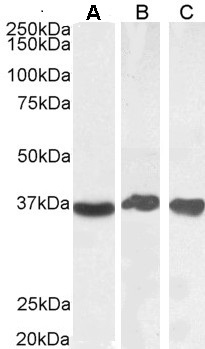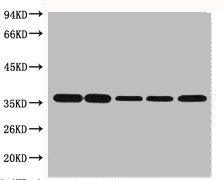GAPDH antibody
GTX100118
ApplicationsImmunoFluorescence, ImmunoPrecipitation, Western Blot, ImmunoCytoChemistry, ImmunoHistoChemistry, ImmunoHistoChemistry Paraffin
Product group Antibodies
ReactivityBacteria, Bovine, Canine, C. Elegans, Chicken, Drosophila, Fish, Hamster, Human, Insect, Mammals, Monkey, Mouse, Plant, Porcine, Rabbit, Rat, Zebra Fish, Other Species
TargetGAPDH
Overview
- SupplierGeneTex
- Product NameGAPDH antibody
- Delivery Days Customer9
- Application Supplier NoteWB: 1:5000-1:100000. ICC/IF: 1:100-1:1000. IHC-P: 1:100-1:1000. IP: 1:100-1:500. *Optimal dilutions/concentrations should be determined by the researcher.Not tested in other applications.
- ApplicationsImmunoFluorescence, ImmunoPrecipitation, Western Blot, ImmunoCytoChemistry, ImmunoHistoChemistry, ImmunoHistoChemistry Paraffin
- CertificationResearch Use Only
- ClonalityPolyclonal
- Concentration0.08 mg/ml
- ConjugateUnconjugated
- Gene ID2597
- Target nameGAPDH
- Target descriptionglyceraldehyde-3-phosphate dehydrogenase
- Target synonymsG3PD, GAPD, HEL-S-162eP, glyceraldehyde-3-phosphate dehydrogenase, OCAS, p38 component, Oct1 coactivator in S phase, 38 Kd component, aging-associated gene 9 protein, epididymis secretory sperm binding protein Li 162eP, peptidyl-cysteine S-nitrosylase GAPDH
- HostRabbit
- IsotypeIgG
- Protein IDP04406
- Protein NameGlyceraldehyde-3-phosphate dehydrogenase
- Scientific DescriptionThe product of this gene catalyzes an important energy-yielding step in carbohydrate metabolism, the reversible oxidative phosphorylation of glyceraldehyde-3-phosphate in the presence of inorganic phosphate and nicotinamide adenine dinucleotide (NAD). The enzyme exists as a tetramer of identical chains. Many pseudogenes similar to this locus are present in the human genome. [provided by RefSeq]
- ReactivityBacteria, Bovine, Canine, C. Elegans, Chicken, Drosophila, Fish, Hamster, Human, Insect, Mammals, Monkey, Mouse, Plant, Porcine, Rabbit, Rat, Zebra Fish, Other Species
- Storage Instruction-20°C or -80°C,2°C to 8°C
- UNSPSC41116161








![Various whole cell extracts (30 μg) were separated by 10% SDS-PAGE, and the membrane was blotted with GAPDH antibody [HL2062] (GTX637966) diluted at 1:5000. The HRP-conjugated anti-rabbit IgG antibody (GTX213110-01) was used to detect the primary antibody.](https://www.genetex.com/upload/website/prouct_img/normal/GTX637966/GTX637966_T-44886_20221209_WB_M_R_23010400_421.webp)